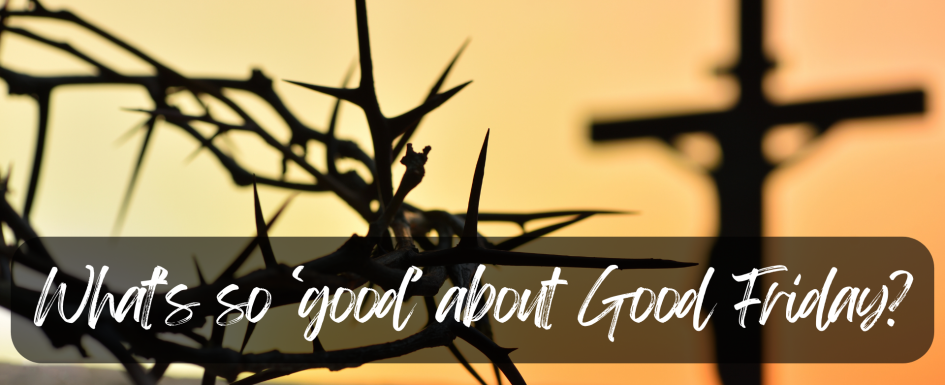That was the question around our dinner table earlier this month.
No pun intended… that is a good question.
Sometimes as Christians we think of what Jesus went through on that fateful Friday – the mockery, flagellation, the carrying of the cross, the crown of thorns and the nails in his wrists and feet – as some utilitarian means to an end. Jesus had to suffer so we could have eternal life.
Jesus’s suffering was redeemed by God to free us from sin and death through resurrection. In that way Good Friday has some goodness in it, but not the betrayal and suffering. Let’s move away from the question of the goodness of Good Friday for a moment to talk about it’s significance.
Good Friday stands as a pivotal moment in Christian faith. At the heart of Good Friday lies the sacrificial love of Christ, epitomized by his willingness to endure the cross for the sake of humanity. In this way, Good Friday invites reflection, solemnity, and profound significance, commemorating the crucifixion of Jesus Christ.
Good Friday also signifies reconciliation and forgiveness. From the cross, Jesus prayed for God to forgive our ignorance in crucifying our Savior. Through his death, Jesus bridged the gap between humanity and God, offering reconciliation to all who believe. As the apostle Paul writes, “God was reconciling the world to himself in Christ” (2 Corinthians 5:19). In a world marked by division and conflict, Good Friday serves as a powerful reminder of the possibility of reconciliation through Christ. Good Friday reminds us that we are called to embody Jesus’s message of forgiveness and seek reconciliation in our communities and beyond even at great cost.
Good Friday can also serve as a call to confront the injustices and oppressive systems of the world. Just as Jesus was unjustly crucified, he didn’t shy away from the oppressive powers nor did he use his privilege to avoid suffering. He endured suffering and injustice so that we could be free to resist evil, injustice and oppression in whatever forms it presents itself. In that way, Good Friday compels us to confront systems of injustice and work towards a world where all may experience the fullness of God’s love and grace.
Good Friday also confronts us with the reality of suffering, both in Jesus’ own experience and in the world around us. Yet, Good Friday also offers hope amidst the darkness. Henri Nouwen once said, “The way of the Cross is the way of suffering. … Yet, it is in our broken, vulnerable humanity that God’s light shines most brightly.” Nouwen is able to see the paradox of suffering through the light of our faith, because Christians suffering can have transformative power — Good Friday challenges us to embrace our own suffering with hope, trusting in God’s redemptive work even in the midst of pain.
I guess what could be ‘good’ about Good Friday is not that what Jesus endures is a means to an end – boxes to check to bring eternal life. Instead Good Friday is a powerful witness, providing evidence that even in the worst of circumstances and the midst of terrible suffering, God is with us. Crying, struggling, straining to go through trials with us and finding some way to make sure ‘that the worst thing is never the last thing,’ as Frederick Buechner is often quoted.
I look forward to sharing in all the many ways we commemorate Good Friday and celebrate Easter together this weekend!


